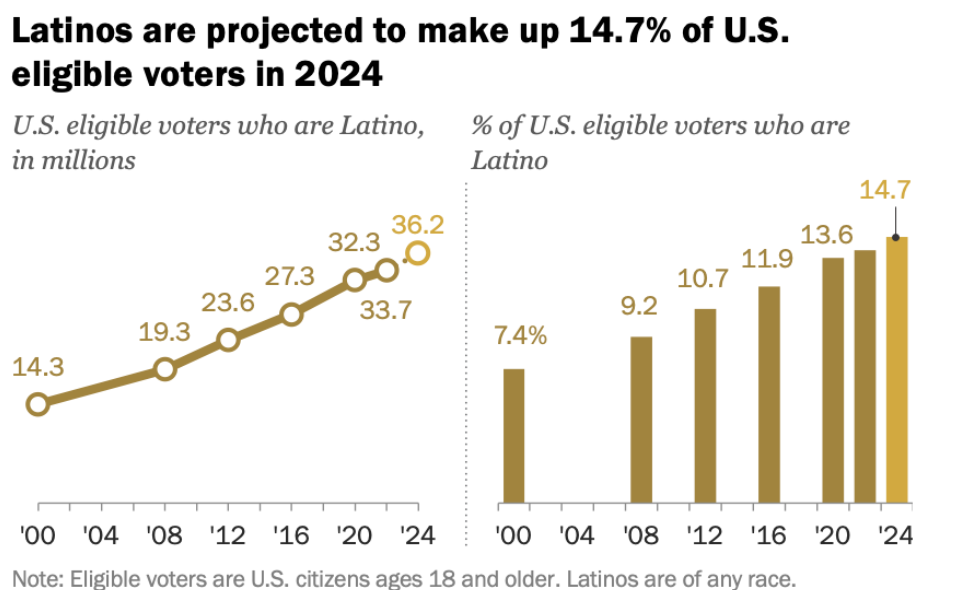Trump faces a sharp drop in Hispanic voter approval over economic fears — a trend that could reshape the outcome of the 2024 presidential election and beyond.
As inflation rises and economic pressures mount, Hispanic voters are reconsidering their political allegiances. Recent polls show a significant decline in Trump’s approval among Hispanic Americans, suggesting that economic conditions are now the most decisive factor influencing this fast-growing voter bloc. In this article, we analyze the latest data, key reasons behind the shift, and the broader implications for America’s political future.

Understanding the Decline: How Hispanic Support for Trump Is Changing
Hispanic voters are increasingly distancing themselves from Donald Trump amid concerns over the economy. A recent Quinnipiac University poll reveals a 12-point drop in Trump’s Hispanic approval rating over just six months.
Latest Poll Highlights:
| State | Previous Support | Current Support | % Drop |
|---|---|---|---|
| Arizona | 39% | 27% | -12% |
| Florida | 44% | 35% | -9% |
| Nevada | 41% | 30% | -11% |
Pollsters note that Hispanic voters now prioritize economic stability and affordable living more than immigration issues, which were previously central topics.
Main Economic Drivers Behind the Declining Support
Hispanic communities have been particularly impacted by economic challenges, which is fueling political shifts. Here’s a breakdown:
| Economic Challenge | Impact on Hispanic Voters |
|---|---|
| High Inflation | Increased food, rent, and gas prices strain household budgets. |
| Job Insecurity | Industries with high Hispanic employment (retail, hospitality) face layoffs. |
| Stagnant Wages | Real wage growth lags behind inflation, reducing purchasing power. |
A 2025 study by Pew Research shows 72% of Hispanic voters rank the economy as their primary election issue.
Key Reasons Hispanic Voters Are Shifting
[Hispanic Voter Shift]
/ | \
Inflation Job Insecurity Wage Stagnation
/ | \
Higher Cost of Retail & Service Reduced Household
Living Burdens Sector Layoffs Purchasing Power
Hispanic voters are motivated less by political rhetoric and more by real-world economic pressures. The more financial strain they experience, the more likely they are to reconsider political loyalties.
How Trump Is Trying to Regain Hispanic Voter Support
Facing alarming poll numbers, Trump’s campaign has pivoted toward the economy:
- Spanish-Language Ads: Focused on job creation and lower taxes.
- Latino Prosperity Summits: Hosted events across Florida, Texas, and Nevada.
- New Economic Proposals: Targeted incentives for small and minority-owned businesses.
Despite these moves, political analysts say winning back Hispanic trust will require real economic improvements, not just messaging.
Why Hispanic Voters Could Decide the 2024 Election
Hispanic Americans are now one of the fastest-growing voting groups in the United States:
- 2020 Election: 14% of voters were Hispanic.
- Projected 2024: 18% of voters will be Hispanic.
States where Hispanic voters will have major electoral impact:
| State | % of Electorate | Importance |
|---|---|---|
| Nevada | 30% | Swing state; critical votes |
| Arizona | 25% | Key battleground |
| Texas | 40% | Emerging competitive state |
Small shifts in Hispanic turnout or support can swing entire states — potentially deciding the presidency.
Younger Hispanic Voters: The Wild Card
Another crucial factor is generational change:
| Age Group | Key Characteristics |
|---|---|
| 18–34 years | Economic issues (jobs, housing) > party loyalty |
| 35–54 years | Slight Republican lean if economic promises met |
| 55+ years | More traditional voting patterns |
Younger Hispanic voters identify more as “issue voters” rather than loyal to either party.
Candidates who offer real solutions to economic issues will likely earn their votes, regardless of political affiliation.
Conclusion: The Future of Hispanic Voter Influence in America
The sharp drop in Trump’s Hispanic voter approval over economic fears signals a major turning point in U.S. politics.
Economic realities—not party branding—are increasingly driving voter behavior, especially among minorities and younger voters.
Unless Trump’s campaign (and the broader Republican strategy) address the tangible economic struggles faced by Hispanic communities, the road to reclaiming support looks steep.
The Democratic Party, on the other hand, must also deliver on economic promises if it hopes to maintain and grow Hispanic loyalty.
Ultimately, America’s future elections will be won or lost based on which candidates offer real, sustainable economic relief.
Hispanic Americans, with their growing numbers and economic concerns, will be at the center of this transformation.
[USnewsSphere.com / PW]





